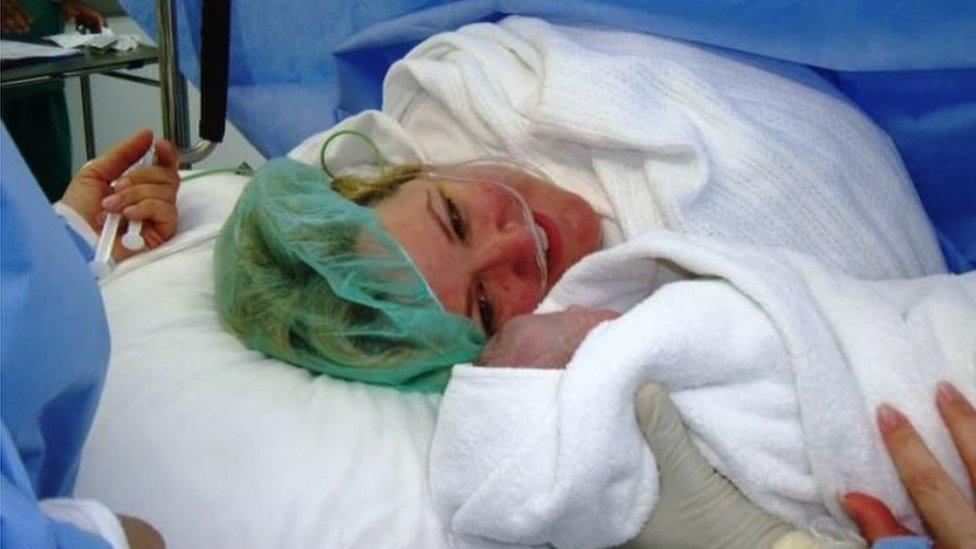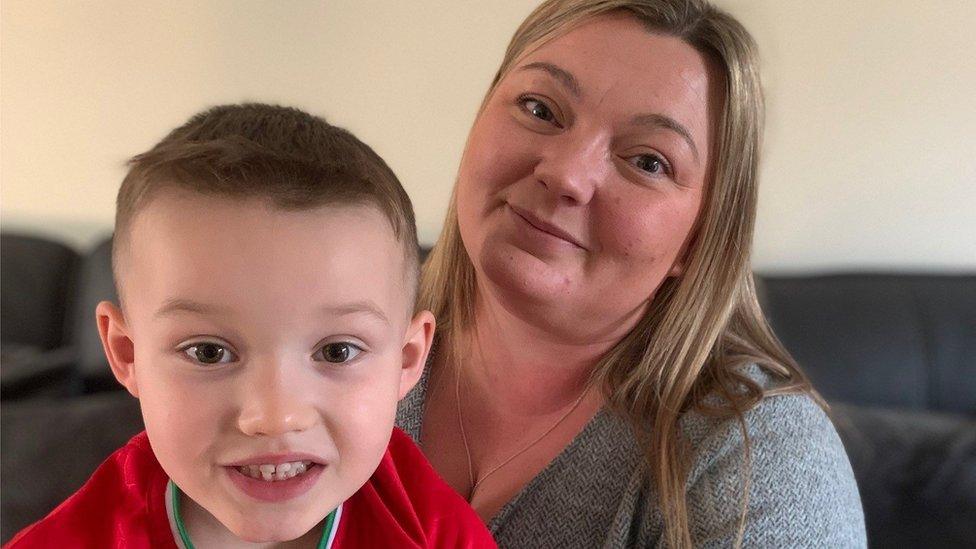Google helps new mum discover postpartum cardiomyopathy
- Published
Pregnancy heart failure: "I hope I wake up tomorrow"
When she was pregnant, Kate Inwood felt her world was complete, and "every box had been ticked" when her son was born.
But three months later she began feeling unwell, and was diagnosed with a rare form of heart failure caused by having a child.
Now she wants to raise awareness of postpartum cardiomyopathy (PPCM) - which can cause heart failure.
When Kate searched for her symptoms on the internet she was shocked to see they matched with heart failure.
Kate, 50, from Newport, said she felt very tired, and like someone was tightening a strap round her chest.
Her symptoms were so bad, she struggled to pick up newborn Llewi.
"I attributed it to being a new mum and having a little one," said Kate, who had Llewi in 2011.

Kate thought life was complete after she had baby Llewi
After seeing no improvement, Kate went to a GP who said she probably had bronchitis and offered her an asthma pump.
However, she wasn't convinced this was the case.
'I remember feeling ice cold'
''I did what everybody should not do and I googled my symptoms and the first thing that came up was heart failure and at that point, I can just remember feeling ice cold,'' she said.
Kate went to see a cardiologist, who took an echocardiogram and she was diagnosed with PPCM.

Kate experienced problems after giving birth
She said: "I remember thinking 'am I going to die, is this it? Is this the end?' 'I've had a beautiful baby boy and I'm never going to see him grow up'.
"It is absolutely terrifying."
PPCM is a condition which leads to changes in the heart that can cause it to become enlarged and can lead to heart failure.
In the most severe cases, it can be fatal or require a heart transplant.
Kate was told she needed to have a pacemaker and an internal defibrillator.
She said: ''If anything happens to my pacemaker, I'm very aware that I'm on the limited time. I have to have a pacemaker in order to live.
''There's no shadow of a doubt, if I don't have one I'm not going to survive this.''

Kate at eight months pregnant with husband Tim
Very little is known about PPCM compared to other heart conditions like coronary heart disease.
The British Heart Foundation is currently funding the UK's first study into the condition, which is due to be completed this month.
Dr Alice Jackson, who is leading the study based in Scotland, is a clinical research fellow at the University of Glasgow's Institute of Cardiovascular and Medical Sciences.
'So much misdiagnosis'
''In our research we've identified that this affects 1 in 5,000 pregnancies in Scotland," said Dr Jackson.
"It's important that any healthcare professional who is looking after women around the time of pregnancy is aware of the condition and is aware to think about it particularly if they have a patient that comes to them and says something's not right.''
Kate said: ''There is so much misdiagnosis. There are so many missed opportunities.
''Don't be afraid to push for further investigation. Don't be afraid to do that. Because if you're wrong, then it's no problem.
"But if you're right, it can save your life.''
Catch up Wales Live on iPlayer

WOMEN OF WALES: Showcasing amazing Welsh female talent and stories
PEOPLE THOUGHT OF AS BITS OF AN ALGORITHM: Life and death in the warehouse

- Published14 February 2022

- Published3 February 2022
